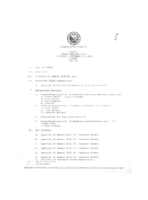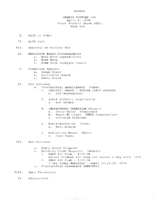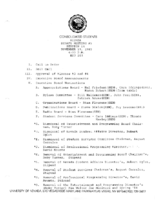Search the Special Collections and Archives Portal
Search Results

Leslie Mujica oral history interview: transcript
Date
Archival Collection
Description
Oral history interview with Leslie Mujica conducted by Barbrara Tabach on June 2, 2020 for the Latinx Voices of Southern Nevada Oral History Project and The Great Pause: Las Vegas Chronicles of the Covid-19 Pandemic. In this interview, Mujica talks about her childhood growing up in Guatemala and immigrating to Southern California with her family in 1980. She discusses her move to Las Vegas in 2005 and her employment history both in nonprofit work and in construction, which led to the pursuit of her current position as the Executive Director and Chief Marketing Officer of Las Vegas Power Professionals. Leslie also shares her educational history with the University of Nevada, Las Vegas. It is where she obtained her Master's Degree in Public Administration and where Leslie currently serves as a board member of the Latinx Voices Project and the Alumni Legacy Board.
Text

Transcript of interview with Peggy Huber by Greg Pushard, March 14, 1981
Date
Archival Collection
Description
On March 14th, 1981, collector Greg Pushard interviewed postmaster Peggy Huber (born March 31st, 1884 in Conway, Arkansas) in her home in Las Vegas, Nevada. This interview covers Peggy’s life in Nevada and also offers an insightful overview of Nevada’s rich history. During this interview Peggy discusses life on the ranch, mining, settlement, and the local early aboveground atomic blasts.
Text

Virginia T. Lanier interview, March 16, 1981: transcript
Date
Archival Collection
Description
From the Ralph Roske Oral History Project on Early Las Vegas collection OH-01060. On March 16, 1981, collector Heidi G. Hughes speaks to Virginia T. Lanier at the collector’s home in Las Vegas, Nevada. Lanier talks about living on the Strip in Las Vegas, Nevada in the 1950’s and 1960’s. She speaks about her experiences riding the bus, working in food service, and what the Strip was like during the time period.
Text

Meeting minutes for Consolidated Student Senate University of Nevada, Las Vegas, November 12, 1987
Date
Archival Collection
Description
Text

Jewish Federation of Las Vegas long-range planning study, 2000
Date
Archival Collection
Description
Long-range planning study conducted and prepared by the Levenberg Consulting Group regarding the Jewish community of Las Vegas with particular attention to Jewish elderly, the economically disadvantaged, young adults, and Jewish education at all ages.
Text

Meeting minutes for Consolidated Student Senate, University of Nevada, Las Vegas, April 4, 1978
Date
Archival Collection
Description
Text

Meeting minutes for Consolidated Student Senate, University of Nevada, Las Vegas, November 29 1983
Date
Archival Collection
Description
Text

Pablo Macias oral history interview: transcript
Date
Archival Collection
Description
Oral history interview with Pablo Macias conducted by Elsa Lopez, Monserrath Hernandez, and Claytee D. White on December 07, 2019 for the Latinx Voices of Southern Nevada Oral History Project. Pablo Macias was rasied in the small town of Carlin outside of Elko, Nevada. His father and mother met in Ogden, Utah where his father was working on railroad in Nevada and Utah. After finishing high school, he got a job at Elko Blacksmith Shop, where he learned to weld. After attending Northern Nevada Community College, he enrolled and graduated from UNR. After graduation, he took a position at Von Tobel Middle School in 1990 teaching Spanish and Physical Education. While working as a Spanish teacher in Rancho High School he enrolled in a Master's program at Nova Southeastern University, completing the program in education administration. He currently serves as the Associate Director of Corporate Work Study Program Operations for Cristo Rey St. Viator College Preparatory High School. Subjects discussed include: Education, Rancho High School, Von Tobel Middle School, Barrick Mining, and Cristo Rey.
Text

Transcript of interview with Horace Emery by Barry Sarles, March 2, 1980
Date
Description
On March 2, 1980, Barry Sarles interviewed river boatman and dam worker, Horace Emery (born 1911 in California) at his older brother’s farm in Nelson, Nevada. This interview covers the local area around Nelson and the early events that helped shape the area. Also present during the interview, Barry Sarles’s girlfriend, Diane Dobaj and Horace’s older brother, Merl Emery. Mr. Sarles also discusses his work as a river boatman on the Colorado River, working on the Hoover and Davis Dams, and employment as a factory worker in Clark County.
Text

Stefani Evans oral history interview: transcript
Date
Archival Collection
Description
Oral history interview with Stefani Evans conducted by Claytee D. White and Barbara Tabach on November 21, 2017 for the Remembering 1 October Oral History Project. In this interview, Stefani Evans discusses how she moved to Las Vegas, Nevada in 1980 with her husband and her feelings associated with the city, especially after the 2017 Las Vegas mass shooting. She describes in detail how she found out about the traumatic event as well as her experience of waiting all day to donate blood on October 2, 2017, the day after the shooting. Mostly, Evans explains with emphasis the good of humanity that she witnessed during the aftermath of that tragedy.
Text
